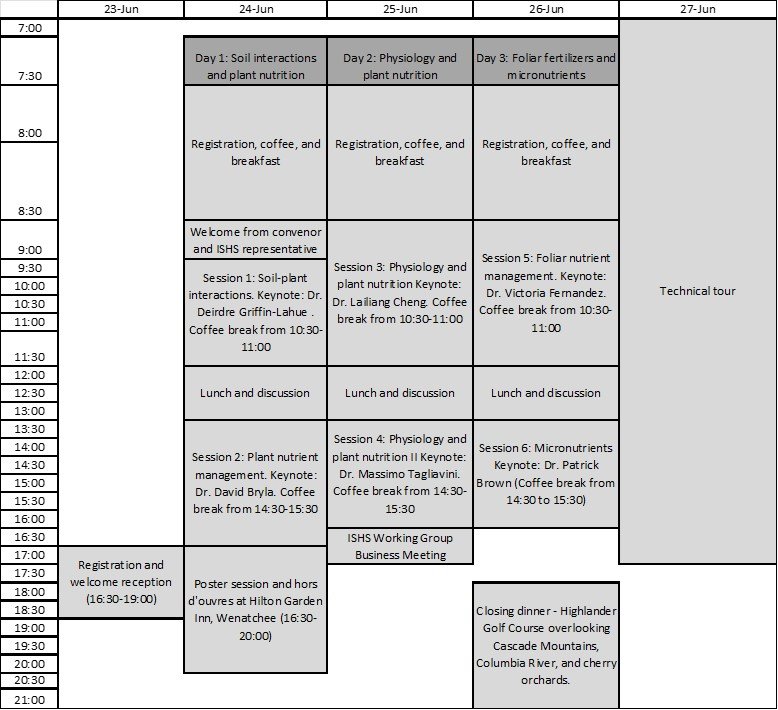Tentative Program for June 23-27, 2024 (Updated March 9, 2024)
Keynote speakers
Dr. Lailiang Cheng, Cornell University
Whole Tree Supply-Demand Relationships for Macronutrients in Apple
Lailiang Cheng received his Ph.D. in horticultural sciences from Oregon State University in 1999 and joined the faculty at Cornell University in 2000. His research has been focused on apple nutrition physiology and management as well as carbon acquisition, transport, metabolism, and vacuolar accumulation of malic acid and sugars. He has published over 100 peer-reviewed research papers and more than 70 extension articles. He has led an interdisciplinary team of researchers from several research institutions to develop and evaluate new rootstocks for sustaining US apple production and fruit quality.
Dr. Deirdre Griffin Lahue, Washington State University
What is 'soil health' and can it improve plant health?
Deirdre Griffin LaHue (she/her) is an Assistant Professor of Soil Quality and Sustainable Soil Management at WSU’s Northwest Washington Research & Extension Center (NWREC) in Mount Vernon. Her research & extension program focuses on the impacts of agricultural practices on soils’ physical, chemical, and biological properties and how these properties relate to key soil functions important to the PNW's diverse soils and cropping systems.
Dr. Massimo Tagliavini, Free University of Bolzen-Bolzano
Understanding nutrient cycling in orchards to optimize fertilization
Massimo Tagliavini is a Professor at the Faculty of Agricultural, Environmental and Food Sciences and former dean of the Faculty of Science and Technology of the Free University of Bozen-Bolzano. Vice-president of Eurac Research (2016-). President of the Italian Society of Horticultural Science (2016-2022). President of the Italian Association of the Scientific Agricultural Societies, AISSA (2020-2023). Chairman of the working group on “Mineral Nutrition of Fruit Crops” of the International Society for Horticultural Science (2012-2017). Agronomist by training, his research interests include the ecophysiology of the cultivated trees under climate change, the nutrient cycling in trees and orchards, the carbon mitigation ability of orchards and vineyards, the C footprint of produce and, in general, the efficient use of resources in the crop production systems.
Dr. David Bryla, USDA-ARS Corvallis
Fertilization and Nutrient Physiology of Small Fruit Crops
David Bryla is a research horticulturist with the USDA ARS Horticultural Crops Production and Genetic Research Unit in Corvallis, Oregon, USA. He completed his PhD in Plant Biology at the University of California, Davis in 1994 and began working for the USDA in 1999. He is recognized internationally for his research on mycorrhizal associations, root physiology, and water and nutrient management of tree fruit, vegetable, and small fruit crops. His primary research goals are to enhance plant growth, increase yield potential, improve fruit quality and safety, and promote resource efficiency in water, fertilizer, and soil use. Some of the ongoing projects in his laboratory include designing efficient fertigation systems, identifying fertilizer methods for increasing fruit calcium and evaluating their effect on yield and fruit quality, developing drought-resistant irrigation strategies, addressing heat damage in berries through irrigation and other horticultural technologies, exploring the benefits of soil amendments such as humic acids and biochar, and assessing the practicality of utilizing nutrient water recovered from waste to fertigate plants produced in soilless media. Dr. Bryla has authored more than 150 scientific publications and compiled the most complete work on fertigation of blueberries and other small fruit crops to date. He is serves as an associate editor on several academic journals, including HortScience, Irrigation Science, and Frontiers in Plant Science, and is a fellow of the American Society for Horticultural Science.
Dr. Victoria Fernandez, Universidad Politecnica de Madrid
Major environmental factors affecting foliar permeability: effects on leaves and fertilisers
Victoria Fernandez was Born in Madrid (Spain). She is holds a Bachelor´s degree (BSc) in Horticulture from University College Dublin (Ireland) and a Ph.D. from Humboldt University of Berlin (Germany). Since the beginning of her Ph.D. studies, she has been working on plant nutrition and physiology with emphasis on the absorption of foliar fertilisers. During her scientific career, she mainly focussed on developing basic and applied studies for characterising the physico-chemical properties of plant surfaces and improving the performance of foliar fertilisers. Victoria is author of more than 80 written scientific contributions largely focussed on plant surface properties and absorption of mineral elements by leaves of agro-forest species. She regularly collaborates with researchers from various disciplines and agrochemical companies.
Dr. Patrick Brown, University of California - Davis
The biology, agronomy and management of Boron
Patrick Brown is a professor of Plant Sciences in the Department of Plant Sciences at the University of California, Davis. Dr. Brown’s research focuses on function and transport of nutrients in plants and the management of nutrients in agricultural ecosystems. Dr. Brown is a highly cited researcher whose contributions include the identification of nickel as an essential element for plants, critical contributions to the understanding of the function, uptake and transport of boron in plants, identification of mechanisms of plant tolerance to heavy metals in the environment and on the mechanisms of action of foliar fertilizers. Dr. Brown has served as chairman and executive committee member of the International Plant Nutrition Colloquium, as co-chairman of the 1st and 2nd International Congress on Biostimulants in Agriculture and has held numerous leadership roles at the University of California, Davis and in state, national and international committees and panels.






